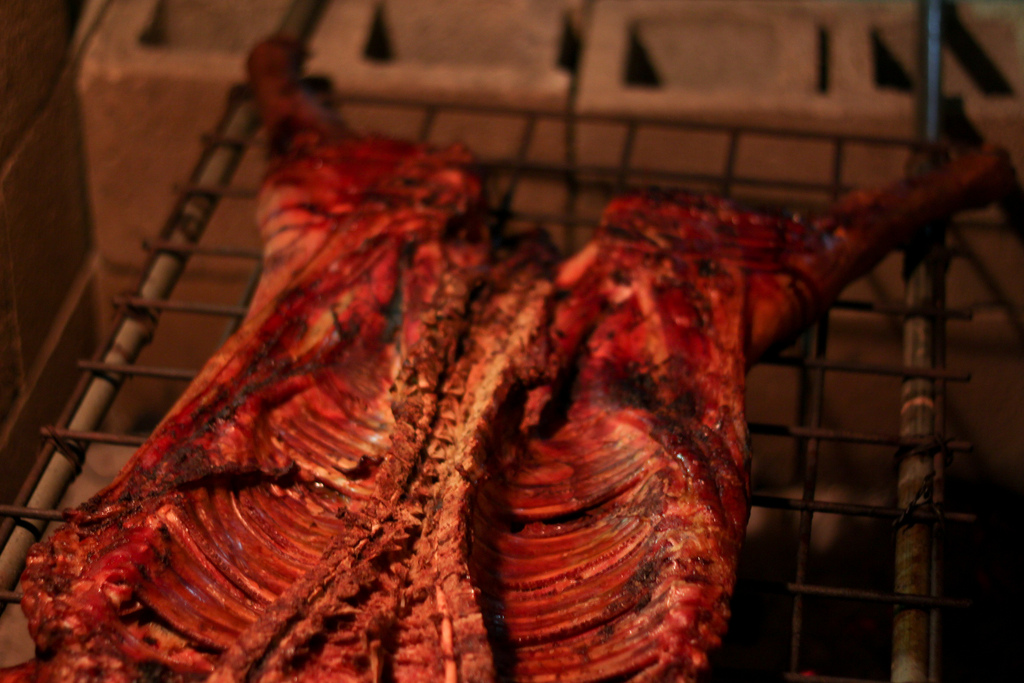Humanity’s past—the far past, as in prehistory—has a curious way of creeping up into the present.
Whether the topic at hand is gender equity in a multinational corporation or the diet of the future, images of Neanderthals lumbering around unspoiled nature are, as Sam Kriss pointed out in a recent essay for The Outline, readily conjured up to point out the correct path to us. They scream: Humans are naturally competitive, men are naturally more assertive than women, and so on. Prehistory has this in common with the future: It is what we dream it to be. The result is a past that resembles an episode of The Flintstones, which is a funhouse mirror reflection of The Jetsons.
Videos by VICE
No trend epitomizes this better than “Bitcoin carnivory,” a diet-slash-lifestyle being promoted by a small but prolific group of cryptocurrency enthusiasts online. The idea is simple: Use only Bitcoin, eat only meat. The espoused benefits are as much spiritual as they are financial and physical, and its advocates are self-serious. For the Bitcoin carnivore, there is a kind of metaphysical parallel between decentralized digital ledgers and an imagined idea of what our ancestors ate, and by extension, how they lived. Politics, food, and money—it’s all connected.
“The 20th century was disastrous for human health and wealth, and the rise of central banking and industrial food was clearly a major reason why,” Michael Goldstein, founder of the Satoshi Nakamoto Institute and a vocal Bitcoin carnivore, wrote me in an email. “Bitcoin is a revolt against fiat money, and an all-meat diet is a revolt against fiat food.”

The implication of “fiat” is that modern money and modern foods are both artificial, and Bitcoin carnivorism supposedly solves this problem. Goldstein has been a dedicated carnivore since 2015, he told me, and eats “only from the animal kingdom, and mostly fat.” When I asked him to spell out the apparent Bitcoin-carnivory-libertarianism trifecta at play, Goldstein responded, “Once you put on the They Live glasses, you can’t take them off,” referring to the 1988 film in which a drifter finds a pair of sunglasses that when worn reveal the world is controlled by evil aliens.
(I reached out to a couple of well-known nutritionists for this article. One responded in an email, saying that the diet is “too ridiculous to be covered.” Another wrote, “Yet another extreme diet. Sigh.”)
You can think of Bitcoin carnivory as an extreme version of the “paleo” diet (as in paleolithic) that supposedly mimics what humanity’s ancestors ate—nuts, vegetables, and lots of meat. Paleo and Bitcoin carnivory are distinguished from other meat-centric diets by their explicit reference to prehistory. Paleo, by basing itself on a past that wasn’t recorded in writing but can only be conjured in imagination, invites politics.
“The people who tell you to eat your 6-10 portions of indigestible toxic grains a day ‘for a healthy and balanced diet’ are the same kind of people who tell you central banks have to determine interest rates for a modern economy to function”
John Durant, the author of the 2014 book The Paleo Manifesto, describes paleo as an alternative to the “left-wing plant-based movement.” At base, the paleo lifestyle says that a return to health (as in politics) means a return to our past. The past here being, of course, a fiction. Recently, University of Adelaide paleomicrobiologists analyzed Neanderthal dental plaque and found that our ancestors’ diets were extremely varied based on what was available to them, and some populations were essentially vegetarian. But nevermind that; both paleo and Bitcoin carnivory, for all of their nods to the past, are about reacting to the politics of now.
“The people who tell you to eat your 6-10 portions of indigestible toxic grains a day ‘for a healthy and balanced diet’ are the same kind of people who tell you central banks have to determine interest rates for a modern economy to function,” Saifedean Ammous, a professor of economics at the Lebanese American University and prominent Bitcoin carnivore, wrote me in an email. “You can choose to listen to them and watch your wealth and health disappear, or you can think for yourself.”
Bitcoin, similar to paleo and carnivory, preaches evils about the present and posits an imagined past as a refuge. Bitcoin’s true believers (often libertarians) say that the modern financial system is corrupt, governed by self-serving elites, and that paper money is a dangerous fiction. The idea is that Bitcoin, by dint of having a limited supply of units, has more in common with ancient monies than the bills in your pocket, which governments can always print more of at will. If you extended this mentality to other parts of your life—like your diet—Bitcoin carnivorism would be the result.

“We live in a digital world, so we can’t transact with gold, but Bitcoin has all the properties of gold, which was the earliest form of currency that we know of,” Ferdous Bhai, a Bitcoin carnivore and founder of Bitcoin media company 21 Mil, told me in a phone interview. His company is named for the digital currency’s finite supply of coins. “The philosophies and principles behind Bitcoin are ancient.”
Bhai acknowledged that there’s a kind of playfulness in the Bitcoin carnivory trend, and said he’s doing it mostly because it simplifies his life. He doesn’t need to think about what to eat, he said, and he only eats once a day.
Many of the people espousing Bitcoin carnivorism on social media are likely not sticking to the diet, Bhai said. It’s just good PR for Bitcoin, to a certain type of person: connecting the dry topic of cryptocurrencies to the image of Neanderthals hunting down a wooly mammoth certainly adds some excitement. But as a way of looking at the world, the kind of prehistory trutherism espoused by Bitcoin carnivorism is just dead boring.
In this formulation, the end of the world will be the same as its beginning. History is inert, a congealed mass of free market and libertarian-leaning politics, a stinking fatberg in ideology’s own sewer pipe.
“If someone is willing to say, ‘Oh hey, I’m into this thing that 90 percent of everyone says is dead wrong,’ then you’ve probably got yourself both a cryptocurrency fan and an all-meat dieter”
It’s all a tad ironic, because the man credited with popularizing carnivorism in cryptocurrency communities doesn’t buy the Neanderthal angle. Zooko Wilcox, who invented the cryptocurrency ZCash, has been a prominent advocate of a carnivorous “ketogenic” diet for years. Wilcox and his ex-wife Amber O’Hearn, who is herself a computer scientist, although not active in the cryptocurrency world, started a blog called Ketotic five years ago to preach the lifestyle’s virtues.
“Nobody really knows how people ate 10,000 or 100,000 years ago, and we’re not necessarily ever going to find out, either,” Wilcox said over the phone. “And whatever people ate long ago does not necessarily indicate what’s best for you to eat today. I find that perspective interesting, but it’s overvalued.”
As for what draws Bitcoiners into the carnivore lifestyle, Wilcox said that it’s likely a shared mentality. “If someone is willing to say, ‘Oh hey, I’m into this thing that 90 percent of everyone says is dead wrong,’ then you’ve probably got yourself both a cryptocurrency fan and an all-meat dieter,” he said.

The ketogenic diet that Wilcox and O’Hearn subscribe to, as do the Bitcoin carnivores, fell out of fashion in the medical community after the 1960s but enjoyed a revival in the late 1990s after Johns Hopkins researchers published a promising multicentre study on the effects of the diet in treating epileptic children. Still, not much work has been done to pin down or verify the diet’s benefits for an already-healthy population. For O’Hearn, the greatest benefit of Bitcoin carnivory is simply that more people are trying the diet.
“Insofar as there is an association between Bitcoin advocates and carnivorous eating, I find this encouraging,” O’Hearn wrote me in an email. “Early adopters in all areas forge paths, test limits, and work out the bugs. The more keen minds we have exploring, the sooner we can help raise the general health and wealth of everyone.”
Perhaps. But for now it’s probably best to leave it at: Using Bitcoin for everything makes about as much sense as eating a steak for every meal. And that’s a sentence you can take two different ways.
Get six of our favorite Motherboard stories every day by signing up for our newsletter.




